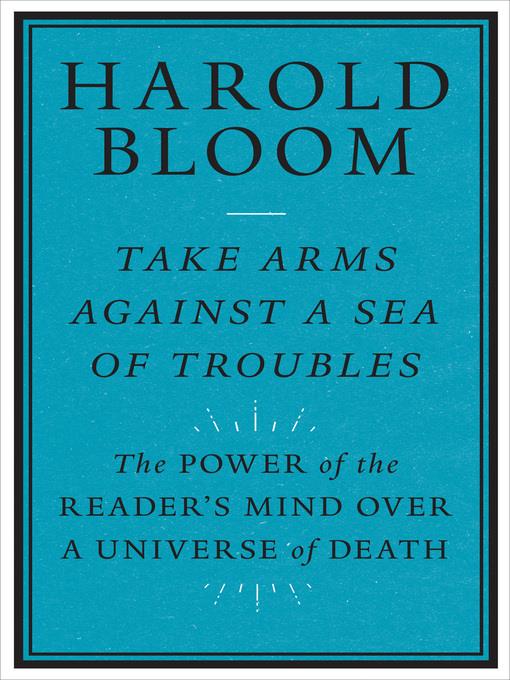
Take Arms against a Sea of Troubles
The Power of the Reader's Mind over a Universe of Death
کتاب های مرتبط
- اطلاعات
- نقد و بررسی
- دیدگاه کاربران
نقد و بررسی

September 14, 2020
Late critic and Yale professor Bloom (Possessed by Memory) leaves behind a passionate reflection on a lifetime of reading. Conscious of his own limited time left, he reflects that “if life is to be more than breathing, it needs the enhancement of knowledge or the kind of love that is a form of knowledge,” as he describes gaining from his favorite authors. These include Walt Whitman, from whom “I never stop learning,” whether about poetry or about the capacity to simply enjoy nature. Another is Samuel Johnson, Bloom’s model reader—the lexicographer “devoured books as he did his meat” from his early days in London, “when he walked the streets knowing where the next meal or bed or book was to be found.” Bloom also shares fascinating glimpses of his academic career, from his testy run-in with British critic F.R. Leavis as a PhD student (Leavis’s statement, “I have buried Shelley,” elicited the “rather brash” reply “Shelley always buries his own undertakers”), to “the theoretical and pragmatic disputes I had been having with Paul de Man and Jacques Derrida at Yale” at a later point. Perhaps Bloom’s most personal work, this is a fitting last testament to one of America’s leading 20th-century literary minds.

Starred review from August 1, 2020
The eminent scholar revisits his literary passions. In 16 dense, erudite, and surprisingly intimate essays, Bloom (1930-2019) offers a sweeping overview of major Western poets, from Homer to contemporary African American Jay Wright, whom Bloom praises as "among the best American poets of whatever origin or complexion." As well as celebrating beloved writers, Bloom also reassesses his own work. "If you live ninety years," he admits, "you will be a battered survivor. Your own mistakes, accidents, failures at otherness beat you down." To assuage those feelings, he advises, "Rise up at dawn and read something that matters as soon as you can." He reconsiders his argument in The Anxiety of Influence (1973), analyzing ways in which writers respond to their predecessors. Now, he reveals, the anxiety of influence "seems to me literary love tempered by ambivalence, as all love is." Throughout, Freud looms large as "a major essayist in the tradition of Montaigne and Emerson, and not as a supposed scientist"; not as "the master of dream interpretation (where I doubt him) and certainly not the would-be therapist (talking cures) but the pessimistic seer of the human condition." Bloom's visceral connection to poets results in vivid, vigorous portraits, whether of poets he knew--Auden, Frost--or those he has read for so long that "it scarcely seems reading anymore." As he writes of Wallace Stevens, "I am now perpetually on oxygen yet still have the sensation that I breathe the clear air of Stevens." Early on in this astute collection, the author marks his terrain: "What you read and how deeply you read matters almost as much as how you love, work, exercise, vote, practice charity, strive for social justice, cultivate kindness and courtesy, worship if you are capable of worship. The mind is an activity and will decay into dark inertia if not sustained by the sustenance of reading." Reading, this stirring collection testifies, "helps in staying alive."
COPYRIGHT(2020) Kirkus Reviews, ALL RIGHTS RESERVED.

























دیدگاه کاربران